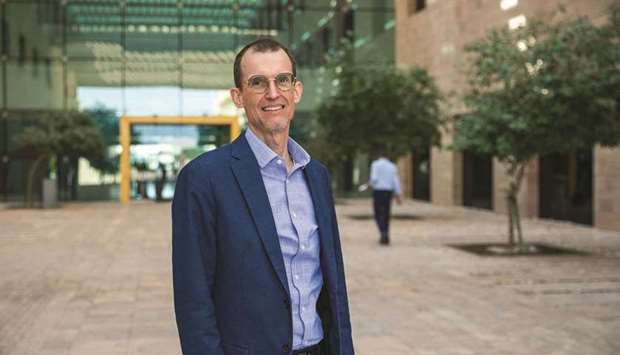Carnegie Mellon University in Qatar’s (CMU-Q) Dudley Reynolds has co-edited a book of insights from around the world on how to approach language education from an inclusive, multilingual perspective.
The book is also edited by Kashif Raza of Qatar University and Christine Coombe of Dubai Men’s College, Higher Colleges of Technology.
“Language is so fundamental to identity,” said Reynolds. “How to approach language education is something almost everyone can relate to.”
Reynolds is the senior associate dean for education at CMU-Q, a Qatar Foundation partner university. The book, 'Policy Development in TESOL and Multilingualism: Past, Present and the Way Forward', was published by Springer in the fall of 2021.
Reynolds notes that traditionally, languages are taught one at a time, and separately from native languages. A multilingual approach would use all of the language tools available to students, including native languages, as resources to get meaning across, and to improve understanding.
“The international community of English language teachers has discussed for many years the need to reposition teaching English. English should not be taught at the expense of learning or knowing other languages,” he said.
Reynolds explored the topic in a research report for the 2019 WISE Summit, 'Language Policy in Globalised Contexts'. Before and during the WISE Summit, Reynolds led several discussions with language educators. “They agreed with the concept of a multilingual classroom, but they were also asking, what does that look like, practically speaking?”
Reynolds, Raza and Coombe decided to explore these practical questions in an edited volume.
“There are many different angles that need to be fleshed out in policies,” said Reynolds. “We were hoping the book would contribute to the conversation.”
The book includes 21 chapters from researchers and practitioners from five continents. “Not only is this conversation about multilingualism already happening in places all around the world, but many teachers are also putting it into practice out of necessity.”
Reynolds believes that Qatar is an excellent example of how multilingualism can enhance language learning. “Qatar is such a rich environment for communication because you have an incredible diversity of individuals. Language teaching should encourage creativity, and you do see here a rich bridging of English, Arabic and many other languages.”
The response from the international language education community has been so enthusiastic that the editorial team is working on a follow-up volume. “The conversation is shifting from a concept into something that is more concrete. The next volume will be more like a handbook that can guide teachers to new approaches in the classroom.”
Reynolds served as president of TESOL International Association in 2016-2017, and has been a teacher and researcher of multilingual language learners for over 30 years. In addition to language education policy, his research addresses developmental patterns in additional language learning, curricular and pedagogical approaches to literacy development, and teacher education and learning.
He has been a member of the CMU-Q faculty since 2007.
“Language is so fundamental to identity,” said Reynolds. “How to approach language education is something almost everyone can relate to.”
Reynolds is the senior associate dean for education at CMU-Q, a Qatar Foundation partner university. The book, 'Policy Development in TESOL and Multilingualism: Past, Present and the Way Forward', was published by Springer in the fall of 2021.
Reynolds notes that traditionally, languages are taught one at a time, and separately from native languages. A multilingual approach would use all of the language tools available to students, including native languages, as resources to get meaning across, and to improve understanding.
“The international community of English language teachers has discussed for many years the need to reposition teaching English. English should not be taught at the expense of learning or knowing other languages,” he said.
Reynolds explored the topic in a research report for the 2019 WISE Summit, 'Language Policy in Globalised Contexts'. Before and during the WISE Summit, Reynolds led several discussions with language educators. “They agreed with the concept of a multilingual classroom, but they were also asking, what does that look like, practically speaking?”
Reynolds, Raza and Coombe decided to explore these practical questions in an edited volume.
“There are many different angles that need to be fleshed out in policies,” said Reynolds. “We were hoping the book would contribute to the conversation.”
The book includes 21 chapters from researchers and practitioners from five continents. “Not only is this conversation about multilingualism already happening in places all around the world, but many teachers are also putting it into practice out of necessity.”
Reynolds believes that Qatar is an excellent example of how multilingualism can enhance language learning. “Qatar is such a rich environment for communication because you have an incredible diversity of individuals. Language teaching should encourage creativity, and you do see here a rich bridging of English, Arabic and many other languages.”
The response from the international language education community has been so enthusiastic that the editorial team is working on a follow-up volume. “The conversation is shifting from a concept into something that is more concrete. The next volume will be more like a handbook that can guide teachers to new approaches in the classroom.”
Reynolds served as president of TESOL International Association in 2016-2017, and has been a teacher and researcher of multilingual language learners for over 30 years. In addition to language education policy, his research addresses developmental patterns in additional language learning, curricular and pedagogical approaches to literacy development, and teacher education and learning.
He has been a member of the CMU-Q faculty since 2007.

